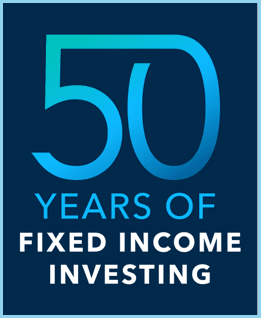Capital IdeasTM
Investment insights from Capital Group
Bonds
Imagine an economy plagued by persistent inflation and a Federal Reserve determined to fight it with aggressive, equally persistent interest rate hikes. While this might sound similar to what investors have recently been experiencing, it also describes 1973.
That year, which marked one of the most turbulent economic environments since the Great Depression, Capital Group began actively managing fixed income portfolios. Over the past 50 years, our portfolio managers have navigated a multitude of market ups and downs, booms and bubbles, crashes and crises. We asked four of our most tenured fixed income portfolio managers — two retired and two current — to provide insights and lessons learned over their long careers.
1. Don’t forget the simple power of bond coupons
Kirstie Spence, fixed income portfolio manager
I joined Capital Group through our undergraduate program, where a rotation brought me to fixed income. I was intimidated initially, but lessons I learned in that initial rotation have stayed with me throughout my career. At the time, a seasoned portfolio manager told me, "Your most important job in fixed income is not to lose money.” From there, it became clear that, in many ways, the concept of fixed income is simpler than people think.
One of the things that gets forgotten with bonds is simply the power of a coupon. In most bond structures, you earn an interest rate that is paid out over a specified period. That payment is very important in contributing to the total return you're going to make on the investments. And certainly, in emerging markets debt, the capital appreciation or the value of the bond can move a lot over its life.
Some things at the macro level are out of your control, but that coupon is a powerful cushion in terms of protecting that investment. And in the emerging markets bond sector where I specialise, it has always been the heart of the annual return and is often underestimated. People forget about that a bit when the headlines focus on interest rate changes, and they start worrying about technical terms like duration. But the coupon is a very powerful thing.
Historically, income has dominated long-term total return
.png)
Source: Bloomberg Index Services Ltd. As of 30/12/22. Past results are not predictive of results in future periods.
2. Know when to surrender
Mark Brett, retired fixed income portfolio manager
Some important lessons come from mistakes. I remember early in my career before coming to Capital Group I came up with what I thought was a brilliant currency trade. Let’s just say, it wasn’t going well. So I approached my supervisor at the time. He asked me, “Do you know the first rule of trading? Surrender.”
As humans, we often cling to bad ideas that we know should be dismissed, but it’s difficult to do so psychologically. Part of being a good investor is knowing when to surrender a bad idea and move on.
One example of a bad idea is continuing to fuel an asset bubble. And that leads to another important lesson: Don't ignore the obvious. Consider the tech bubble in the late 90s. A lot of investors looking at it thought it was a bubble, but they didn't know how it would turn out or think through the consequences.
The same is true of the 2007 housing bubble. It was obvious that there was a bubble in residential real estate. But how would it end? That one turned out to be a huge deal, as we all now know, due to the implications for money and credit. Some of the most brilliant investors lost enormous amounts of money.
Pointing out the obvious and surrendering a bad idea might seem like basic concepts, but you would be amazed at how tricky they can be for some investors.
Some notable asset bubbles over the last 40 years
.png)
Sources: Capital Group, ICE Benchmark Administration Ltd, London Bullion Market Association (LBMA), NASDAQ, Nikkei, NYSE Arca, NYSE, Refinitiv Datastream, Standard & Poor's, Stock Exchange of Thailand (SET). Figures reflect cumulative price changes over 8-year periods in which the asset's price increased at least 250% before falling at least 50 percentage points. Benchmarks used: gold bullion price per troy ounce as quoted by the LBMA (gold); Nikkei 225 Index (Japan); Bangkok SET Index (Thailand); NASDAQ Composite Index (U.S. tech); S&P Homebuilders Select Industry Index (U.S. housing); NYSE Arca Biotech Index (biotech); NYSE FANG+ Index (U.S. large cap internet). As of 31 December, 2022.
3. Company relationships are key in credit markets
David Daigle, fixed income portfolio manager
A skill that I did not have when I started at Capital but worked to develop was building relationships. In active management, cultivating strong connections with the C-suite of the companies we invest in is essential. And I've always felt that if I can build a mutually symbiotic relationship with a management team, I'm providing value to them and they're providing value to me. Those are the relationships that will endure over many years.
Our relationship can benefit a company’s management team by sharing our insights with them about how we think as investors. Our discussions help them to understand what the investment community is looking for and sometimes what the rating agencies are looking for.
What we get as investors is a better understanding of their strategy and whether they are good candidates for our portfolios. They can share how they see their competitive positioning and what they think of their competitors. They may explain how they think about the regulatory structure in which they operate, or what their aspirations are over different time horizons. We're sharing information with them and they're sharing information with us. That's where I think you build really lasting, tight relationships.
4. Collaborative research is crucial
John Smet, retired fixed income portfolio manager
There were many lessons I learned during my years as a professional investor, but I’m struck by what I’ve experienced since retiring. Now I am a fund shareholder instead of a fund manager. The contrast is remarkable when I try to assess investment opportunities on my own.
Just think about where we are today with markets and fixed income. There are questions in many investors’ minds: Has the Fed stopped raising rates? Is inflation here to stay? What about a recession? Is the dollar going to strengthen?
These questions are difficult to answer for professional investors with vast resources. But they’re near impossible to answer as a shareholder in my kitchen, reading the newspaper or listening to the news trying to figure all this out.
By contrast, at Capital Group, I had hundreds of analysts that I was able to interact with, along with other colleagues and outside specialists. It was really a stunning amount of information. The thing that strikes me, as I look at the world and the markets, is how blessed I was to have all those resources as a fund manager and the value of collaboration.
.jpg)
John Smet in the trading room, 1986.

Our latest insights
-
-
Long-Term Investing
-
-
-
Fixed Income
RELATED INSIGHTS
-
Portfolio Construction
-
-
Fixed Income
Hear from our investment team.
Sign up now to get industry-leading insights and timely articles delivered to your inbox.
Past results are not predictive of results in future periods. It is not possible to invest directly in an index, which is unmanaged. The value of investments and income from them can go down as well as up and you may lose some or all of your initial investment. This information is not intended to provide investment, tax or other advice, or to be a solicitation to buy or sell any securities.
Statements attributed to an individual represent the opinions of that individual as of the date published and do not necessarily reflect the opinions of Capital Group or its affiliates. All information is as at the date indicated unless otherwise stated. Some information may have been obtained from third parties, and as such the reliability of that information is not guaranteed.
Capital Group manages equity assets through three investment groups. These groups make investment and proxy voting decisions independently. Fixed income investment professionals provide fixed income research and investment management across the Capital organisation; however, for securities with equity characteristics, they act solely on behalf of one of the three equity investment groups.
 Kirstie Spence
Kirstie Spence
 David Daigle
David Daigle
 Mark Brett
Mark Brett
 John Smet
John Smet